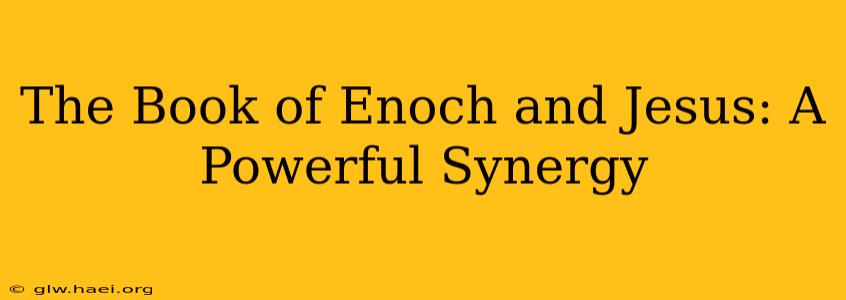The Book of Enoch, a fascinating and often-controversial text excluded from the canonical Bible, holds a unique position in religious studies. For centuries, its apocryphal status has fueled debate, yet its influence on early Christian thought and its striking parallels with the life and teachings of Jesus are undeniable. This exploration delves into the intriguing connections between these two seemingly disparate entities, revealing a powerful synergy that has resonated throughout history.
What is the Book of Enoch?
Before we explore its relationship with Jesus, let's understand the Book of Enoch itself. Written sometime between the 3rd century BCE and the 1st century CE, it details the story of Enoch, a patriarch who, according to the Bible (Genesis 5:21-24), walked with God and was taken to heaven without dying. The Book of Enoch is far more than a simple biography, though. It's a complex work that weaves together cosmology, angelology, prophecy, and apocalyptic visions. It describes the fallen angels, their interaction with humanity, the coming judgment, and the eventual establishment of God's kingdom. This rich tapestry of narrative and prophecy is what makes it so compelling and enduring.
Did Jesus Know About the Book of Enoch?
This question is central to understanding their connection. While we don't have direct textual evidence that Jesus explicitly read or quoted the Book of Enoch, the thematic resonance between its prophecies and Jesus's ministry is striking. Several scholars suggest that the ideas presented in Enoch, particularly its emphasis on the coming judgment, the importance of righteousness, and the role of heavenly beings in human affairs, deeply influenced early Christian thought. These ideas may have filtered down to Jesus and his contemporaries, even if not through direct familiarity with the text itself.
How Does the Book of Enoch Parallel the Life and Teachings of Jesus?
The parallels aren't always direct quotes, but rather thematic echoes. For instance, Enoch's emphasis on righteous living and the condemnation of wickedness finds a clear parallel in Jesus's teachings. Both figures emphasized the importance of humility, love for one's neighbor, and the coming judgment. The descriptions of heavenly beings and their roles in human affairs found in Enoch also resonate with the New Testament's depiction of angels and the divine intervention in Jesus's life.
The Son of Man Figure:
Perhaps the most significant parallel lies in the "Son of Man" figure. In the Book of Enoch, the Son of Man is a divine figure who plays a central role in the coming judgment. This figure shares striking similarities with the self-designation of Jesus in the Gospels. While the exact interpretation of the "Son of Man" remains debated, its presence in both texts points to a shared eschatological understanding.
The Concept of Judgment:
Both the Book of Enoch and the teachings of Jesus prominently feature the concept of judgment. Enoch vividly portrays a future judgment where the wicked are punished and the righteous are rewarded. This resonates powerfully with Jesus's parables and pronouncements about the final judgment and the importance of living a life pleasing to God.
The Concept of a Coming Kingdom:
Enoch describes a future kingdom of God, a time of peace and justice, which aligns with the Christian hope of the kingdom of heaven. This expectation of a future, perfect realm is a shared theme between the two texts.
Was the Book of Enoch Influential in Early Christianity?
Yes, undeniably. Though not part of the canonical Bible, its influence on early Christian thought is evident. Several ideas and themes present in the Book of Enoch found their way into early Christian writings and interpretations of scripture. The intertestamental period, the time between the Old and New Testaments, saw a flourishing of apocryphal and pseudepigraphal writings, and the Book of Enoch held a significant place within this literary landscape.
Why is the Book of Enoch Important Today?
Even today, the Book of Enoch offers valuable insights into the religious and cultural landscape of the Second Temple period. It sheds light on the beliefs and expectations of the Jewish people during the time of Jesus. Its apocalyptic vision continues to resonate with readers grappling with questions of justice, morality, and the nature of God. It's a testament to the enduring human fascination with the afterlife, the struggle between good and evil, and the ultimate hope of redemption.
The Book of Enoch and Jesus share a powerful synergy, not necessarily through direct textual connection, but through a compelling convergence of themes, ideas, and eschatological perspectives. Its influence on early Christianity, its rich narratives, and its enduring appeal make it a crucial text for understanding the religious context of Jesus's life and the development of early Christian thought. This subtle yet potent connection invites further exploration and sheds light on the complex tapestry of religious history.

